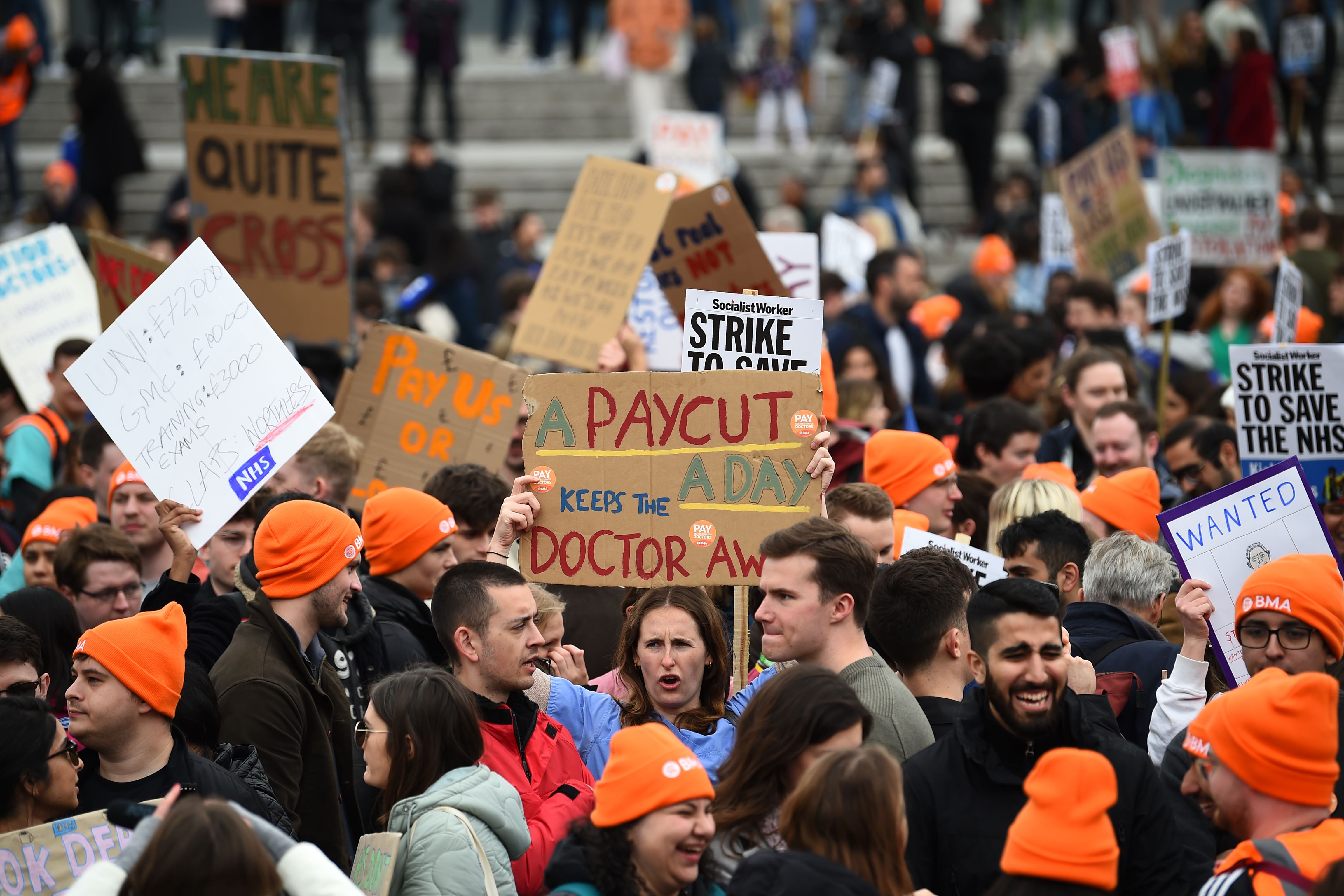More than 200,000 NHS appointments postponed last week due to junior doctors’ strike
Paramedics’ union likely to reject government offer next week

Your support helps us to tell the story
From reproductive rights to climate change to Big Tech, The Independent is on the ground when the story is developing. Whether it's investigating the financials of Elon Musk's pro-Trump PAC or producing our latest documentary, 'The A Word', which shines a light on the American women fighting for reproductive rights, we know how important it is to parse out the facts from the messaging.
At such a critical moment in US history, we need reporters on the ground. Your donation allows us to keep sending journalists to speak to both sides of the story.
The Independent is trusted by Americans across the entire political spectrum. And unlike many other quality news outlets, we choose not to lock Americans out of our reporting and analysis with paywalls. We believe quality journalism should be available to everyone, paid for by those who can afford it.
Your support makes all the difference.Around 200,000 hospital appointments were postponed last week as a result of the four-day walkout by junior doctors, new NHS data has confirmed.
The figures come as paramedics, represented by union Unite, are now expected to reject the government’s pay offer, putting the whole deal at risk.
Unite, which is due to close its ballot next week, said on Monday: “So far, the known results show that members in a large number of NHS trusts are voting to reject the offer. Union representatives in those trusts with a live strike mandate will now be issuing strike notices. This was agreed at a Unite meeting today, which will herald a wave of new strikes early in May.”
Unite’s comments follow the shock result of a ballot by the Royal College of Nursing (RCN), whose members narrowly rejected the government’s pay deal last Friday.
The deal, offered to the nurses’ and paramedics’ unions in March, would see members awarded a 5.2 per cent pay increase in this financial year and two one-off payments in respect of the previous financial year.
The news comes after last week’s 96-hour strike by junior doctors led to the postponement of 196,000 appointments and procedures in general hospitals. In addition, just over 4,000 were postponed by mental health hospitals, and 570 by community health providers.
To date, 531,000 appointments have had to be rescheduled as a result of strike action undertaken by nurses, doctors, paramedics and other NHS staff since December.
NHS medical director Sir Stephen Powis said the latest figures on the fallout from the junior doctors’ strikes “lay bare the colossal impact of industrial action” on the NHS. The figures are also likely to be an underestimate, as hospitals avoided making appointments on days when industrial action was set to take place.
Sir Stephen added: “Our staff now have an immense amount of work to catch up on hundreds of thousands of appointments, all while continuing to make progress on tackling the backlog of people who have been waiting for the longest for treatment. We have now seen nearly half a million appointments rescheduled over the last five months, and with each strike, it becomes harder.
“While our staff are doing all they possibly can to manage the disruption, it is becoming increasingly difficult, and the impact on patients and staff will, unfortunately, continue to worsen.”
Sir Julian Hartley, the chief executive of NHS Providers, which represents all NHS hospitals, said: “We can’t go on like this. If the planned new strikes by nurses and by Unite members at some trusts go ahead, we will be facing the sixth straight month of industrial action in the NHS.
“Trust leaders want what’s best for patients and staff. The huge number of rescheduled operations and appointments will keep climbing unless the government sits down with unions to find a way to prevent any more strikes.”
Last week, after the RCN’s members voted to reject the deal, Unison, which is the largest health union, voted in favour of accepting it. Following the vote by the nursing union, RCN chief Pat Cullen warned that a new set of strikes could continue until Christmas. However, any further strike action after May would require the RCN to seek the approval of its members via another ballot.
Members of both Unite and the GMB union have until Friday 28 April to vote on the deal. Results are also expected next week from smaller unions, such as the Chartered Society of Physiotherapy, which has recommended that its members accept the offer, and the Society of Radiographers, which has recommended that its members reject it.




Join our commenting forum
Join thought-provoking conversations, follow other Independent readers and see their replies
Comments